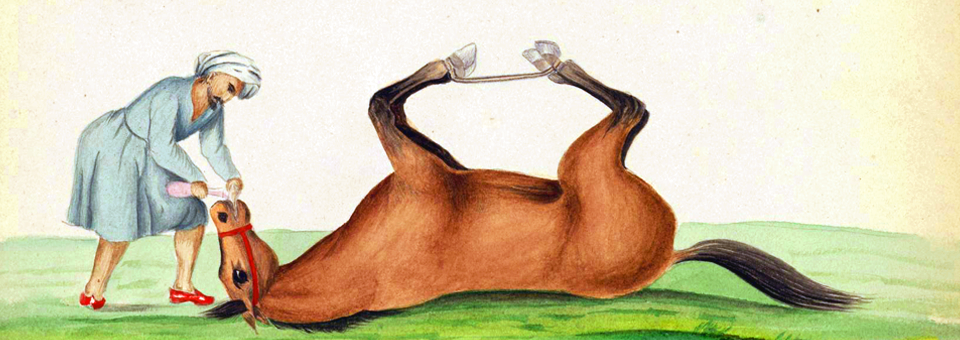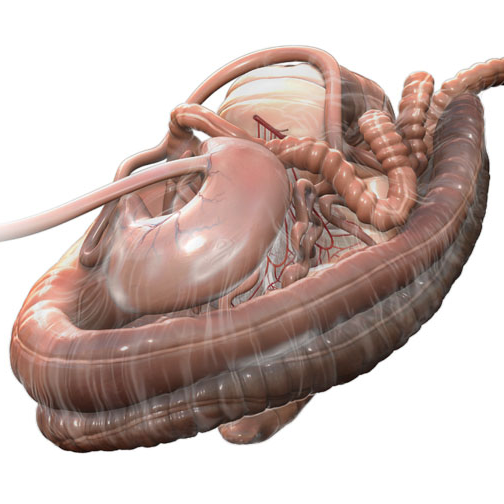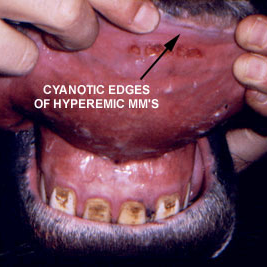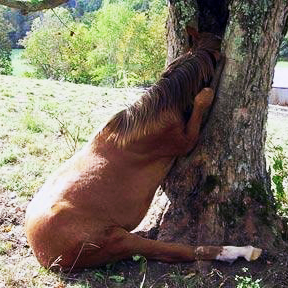You can get in touch with me by telephone or text during normal business hours, through the email form below, or by postal mail at the address listed below.
For emergencies, please call, do not use the contact form.
Contact
Contact Information
484-447-6945
P.O. Box 5011
Limerick, PA 19464
drjessvet.com
Colic in Horses
What Does it Actually Mean to Colic?
Posted on: March 18, 2014

Ahmed Ata Tayyarzade treating a horse suffering from colic with vinegar and olive oil (1271 C.E.)
Colic
The word colic is one that strikes fear in the minds of many horsepeople. Most owners will have dealt with it at some point, either with their own horse or with that of an acquaintance at the barn, but their experiences will vary depending on the exact diagnosis. What does “colic” actually mean, though? It probably means different things in the minds of different people. Some people will have experienced only mild episodes that resolved easily, while others may have had only one opportunity to see a colicky horse with a poor outcome. The word “colic” simply means abdominal pain. It is a very vague term and not a very specific diagnosis, as there are a host of conditions that can lead to abdominal pain of varying degrees.

Why do horses seem to have so many problems with colic? Although horses appear to be big, sturdy animals, their gastrointestinal tract's design seems problematic. In total, horses have approximately 100 feet of gastrointestinal tract, including a 3 foot long esophagus, a 2 to 3 gallon capacity stomach, lots of small intestine, a cecum (the fermentation vat of horses), and also large and small colons, terminating in the rectum. Equines also have an interesting gut layout which is unlike that of other species. Their small intestine is relatively free-floating in the abdomen, attached at the “roof” of the abdomen in only one place, similar to a hanging shower curtain, and nestles within the folds of the large colon. The large colon wraps around the abdomen in a double horseshoe configuration and takes up the most space in that cavity. There are several tight turns in the layout, the most problematic being the pelvic flexure of the large colon where there is a narrowing and a hairpin turn simultaneously. A particular combination of enzymes, bacteria and fungi bathed in the correct pH help digest food along the way. Changes to the composition of the gut contents can upset digestion by altering the amounts of helpful microbes and encouraging the growth of bad ones. The GI tract of horses is also very sensitive to changes in the barometric pressure and temperature of the atmosphere outside. Many horses react to rain or snow coming and going by colicking.

The most common signs of colic in a horse are related to discomfort from cramping and increased pressure from gas, fluid or manure backed up within the gut. Lying down, rolling, pawing and inappetance are often noted by owners. These may be accompanied by a decrease in manure production and water intake. When we examine colicky horses, we may note an increase in heart rate and respiratory rate due to pain, abnormal gastrointestinal noises (increased, decreased, gassy, fluidy), and discolored or dry gums. A rectal examination can also yield useful clues about the cause of the pain, as we can palpate the back portion of the gut through the rectal wall. Impactions (constipation), gas distended small intestine or colon and portions of the tract situated in the wrong place can be felt on rectal exam. Passing a nasogastric tube into the stomach via a nostril allows us to determine if there is a backup of fluid (reflux) into the stomach due to poor motility or a physical blockage such as a twisted colon, and also gives us a route to administer laxative mineral oil and electrolytes if there is no excess fluid found.
The easiest way to divide colics into types in my mind is surgical versus non-surgical. Colics that usually require surgery to manually correct include those involving twists in the intestine or colon, blockages caused by masses such as strangulating lipomas (fatty tumors on long stalks that can become wrapped around the gut), and displacements of the large colon into the wrong position from excess gas. Non-surgical colics are usually the result of a change in motility and include simple gas colic, most impactions, and anterior enteritis. These types of colic can generally be remedied with a combination of medications (pain relievers, anti-spasmodics and sedatives) and fluids, either by nasogastric tube or intravenously, depending on the case. Since anterior enteritis is a type of colic most clients have not heard about and find confusing, I plan to devote the next blog entry to covering it in more detail.

Is there anything that can be done to prevent colic? Although I often wish I could control the weather (and thus prevent many colics!) that is just not possible, so we have to deal with the inevitable changes in barometric pressure. The most important thing we can do to help prevent colic is to maintain regularity in a horse's routine and diet. There is no need to feed at the exact same time every day, and there have even been studies to show that some variation in the time of feeding (within a few hours) can help the horse adjust to potentially adverse changes in gut motility in the future. The type and amount of food fed should be consistent, with any changes in volume or kind of hay or grain being made slowly over 10 to 14 days. It is best to feed small amounts over the course of the day as that is closest to the natural eating pattern of the horse in the wild and what their gut is made for. Horses are best equipped to eat mainly forage such as grass and hay, with small amounts of concentrates such as grain added as needed. Too large an amount of carbohydrates can upset the gut flora and alter pH leading to issues. Free choice fresh water is important as well. Using heated buckets in the winter can help promote good drinking habits once the water turns frigid. Some horses that tend to colic on a regular basis with changes in the weather or in response to stress may benefit from dietary supplements including probiotics to help digestion. Internal parasites (worms) can also cause colic, so formulating a worm surveillance plan (regular fecal float exams) and deworming program for each horse's particular situation with your veterinarian is important.
There are many potential causes for colic and not enough reliable ways to prevent it. The best thing horse owners can do is be aware of any changes in the behavior of their horses, and keep a good relationship with their veterinarian, who will help to answer questions about what is being seen.